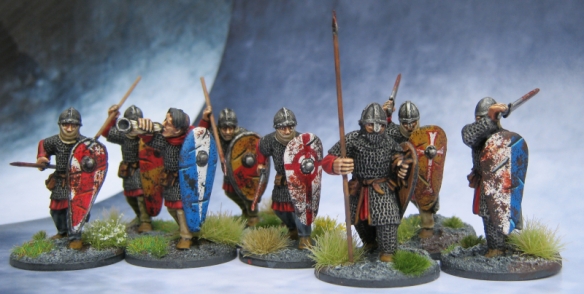
The period when Flemish mercenaries are most often mentioned by twelfth-century English sources—the civil wars of King Stephen’s reign (1135–54)—there is no evidence of a treaty having been concluded between Stephen and Count Thierry. Yet we know that Stephen employed the services of Flemish mercenaries, and relied in particular on Thierry’s illegitimate cousin, William of Ypres, who was one of the king’s most prominent supporters from 1137 until his retirement from active duty in the late 1140s. Though later chroniclers took pains to paint the Flemish mercenaries as the standard bearers of strife and to specifically associate them with Stephen, the king’s rivals, the faction supporting Empress Matilda, employed them just as readily. Robert fitzHubert, the most infamous Flemish mercenary-turned- robber-baron, once served Earl Robert of Gloucester. Yet another employer of unruly Flemish retainers, Geoffrey of Mandeville, fought on both sides of the conflict. In this turbulent political climate, the ability to draw military strength from places outside the divided kingdom was a powerful advantage. Flanders, alongside Brittany, was the most important sources of mercenaries. The absence of any mention of a formal agreement with Count Thierry, however, leads one to suspect that mercenary recruitment occurred informally, through the channels provided by the Anglo-Flemish community or through personal connections with the Anglo-Norman aristocracy. Geoffrey, for instance, even sent his son William to be reared in Thierry’s court.
Whatever the reason for Thierry’s reticence, it ended with the triumph of Empress Matilda’s faction. Thierry met with King Stephen and Matilda’s son, the future King Henry II (1154–89) in Dover in February 1154, again with Stephen in Dover in October, and was present at Henry’s coronation ceremony in December. In 1156 he and his wife Sibyl met with Henry II in Rouen. The royal Pipe Rolls show annual payments of c. 400 pounds being made to the count between 1156 and 1160. It is very probably that these reflect the re-establishment of the Anglo-Flemish money fief. If Flemish mercenaries served in the king’s armies on his continental campaigns in Brittany and Toulouse in 1158 and 1159, then a diplomatic contract would have formed a useful channel through which to conduct the recruitment. The count of Flanders was an important political ally to the young king on the international scene, but Henry II must have also looked for his help in dealing with Flemings already in England. In the late 1150s he expelled or neutralised many of King Stephen’s Flemish supporters. Many of these Flemings had arrived to England as mercenaries but relatively recently, and so must have maintained connections to the continent in the form of property or family. Henry’s ability to call upon Thierry’s aid in handling their cases was thus a useful tool. An equally pressing concern must have been the wrestling of control over mercenary recruitment from the lower rungs of the aristocracy back into the hands of rulers. For Henry II, this consolidated royal power and diminished the threat of a potentially dangerous accumulation of independent military might among his vassals. For Thierry, this meant the re-establishment of a lucrative money fief and a greater degree of control over Flanders’ free-floating military resources. The amount of diplomatic traffic that is evident during these years suggests that both sides were eager to create firm relations, and mercenaries continued to play an important role in the military and political relations between the two realms.
Who is William of Ypres?
William of Ypres was a mercenary captain in the middle ages, and one of the king’s most prominent supporters from 1137 until his retirement from active duty in the late 1140s
Who is Robert Fitzhubert?
Robert Fitzhubert was the most infamous Flemish mercenary-turned- robber-baron. He once served Earl Robert of Gloucester.